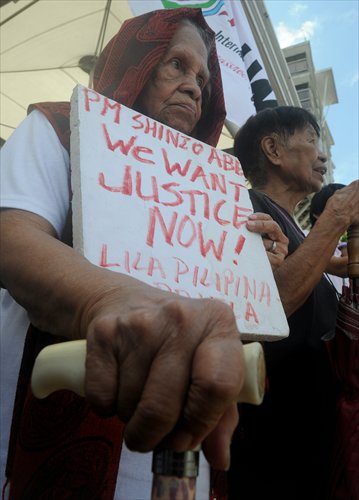Abe hits key words, avoids new apology
Japanese PM’s war anniversary speech criticized as insincere

An elderly Filipino woman, holding her cane and a placard, attends a protest during a rally by former sex slaves of the Japanese Imperial Army in front of the Japanese Embassy in Manila on Friday. Filipino "comfort women" call for an official apology from the Japanese government and just compensation as the world commemorate the 70th anniversary of the end of WWII on Saturday. Photo: AFP
In a much-anticipated speech to mark the 70th anniversary of WWII's end on Friday, Japanese Prime Minister Shinzo Abe said he upheld past government apologies for Japan's wartime past, including the landmark 1995 statement by then prime minister Tomiichi Murayama.
Analysts said that Abe's position had improved, as he mentioned "aggression" and "colonial rule" in his speech, albeit indirectly, but said that the statement stopped short of sincere repentance as no fresh apology was offered.
Abe expressed "utmost grief" for the suffering Japan inflicted on other countries during WWII, but said that future generations of Japanese should not have to keep apologizing for the mistakes of the past.
"Incident, aggression, war - we shall never again resort to any form of the threat or use of force as a means of settling international disputes. We shall abandon colonial rule forever and respect the right of self-determination of all peoples throughout the world," said Abe.
China and South Korea, which suffered under Japan's aggression before and during WWII, had insisted Abe stick to the 1995 Murayama Statement for suffering caused by Tokyo's "aggression and colonial rule."
Analysts acknowledged Abe's mentioning of the key words but criticized his "indirect" language, calling his statement a "watered-down" apology that fails to show sincerity.
"Abe, who rarely talked about 'aggression' in previous speeches, has shown improvement," Feng Zhaokui, an expert of Japanese Studies from the Chinese Academy of Social Sciences (CASS), told the Global Times. "However, he had chosen his words in a way to circumvent directly admitting to the world of Japan's wartime aggression. He only spoke of such acts as something Japan has to avoid in the future."
Abe statement made a drastic difference from the 1995 landmark Murayama Statement, which said that "following a mistaken national policy," Japan, "through its colonial rule and aggression, caused tremendous damage and suffering to the people of many countries, particularly to those of Asian nations."
China's foreign ministry on Friday urged Japan to clearly acknowledge the nature of its invasion and its responsibility for the war.
"Japan must sincerely apologize to people from the victimized countries and make a clear break from its militaristic past without any concealment on major issues," the foreign ministry said, adding that China's Vice Foreign Minister Zhang Yesui has stated China's solemn position to the Japanese Ambassador.
Abe's speech came as he pushes for a change of Japan's defense policy that could allow troops to fight abroad for the first time since WWII, sparking large protests in Tokyo and sending Abe's ratings to below 40 percent.
The move also sparks concerns from neighboring countries China and South Korea, which worry that the change of security bills might disrupt stability in East Asia.
"Abe's statement is carefully prepared and trimmed, trying to address concerns from various sides. It's balanced but nonetheless ambiguous," Jin Canrong, Associate Dean with the School of International Studies at Renmin University of China, told the Global Times.
Jin's opinion was echoed by Zhang Yong, a research fellow with the CASS, who said that Abe's speech has given mixed signals and failed to clarify his own attitude on major historic issues despite his constant emphasis of his upholding of past government stances.
"Judging from Abe's policies, he desperately wishes to make a breakthrough on the security bills. This speech could be Abe's strategy to remove obstacles to help achieve his political ambitions," Zhang told the Global Times, adding that the statement sounds more like a compromise.
Other experts said the speech also serves to appease the US, which has grown increasingly concerned over the discord between Japan and South Korea, its two key allies in East Asia, over historic issues.
Words not enough
South Korea said on Friday it would announce its position on the speech by Abe after a close review.
South Korean Foreign Minister Yun Byung-se told his Japanese counterpart that action by Japan was more important than anything else, suggesting that words alone were not enough.
Meanwhile, Abe's statement failed to directly refer to the "comfort women," a Japanese euphemism for about 200,000 women who were forcibly recruited as sex slaves for Japanese military-run brothels.
"We will engrave in our hearts the past, when the dignity and honor of many women were severely injured during wars in the 20th century," said the prime minister.
Agencies contributed to this story